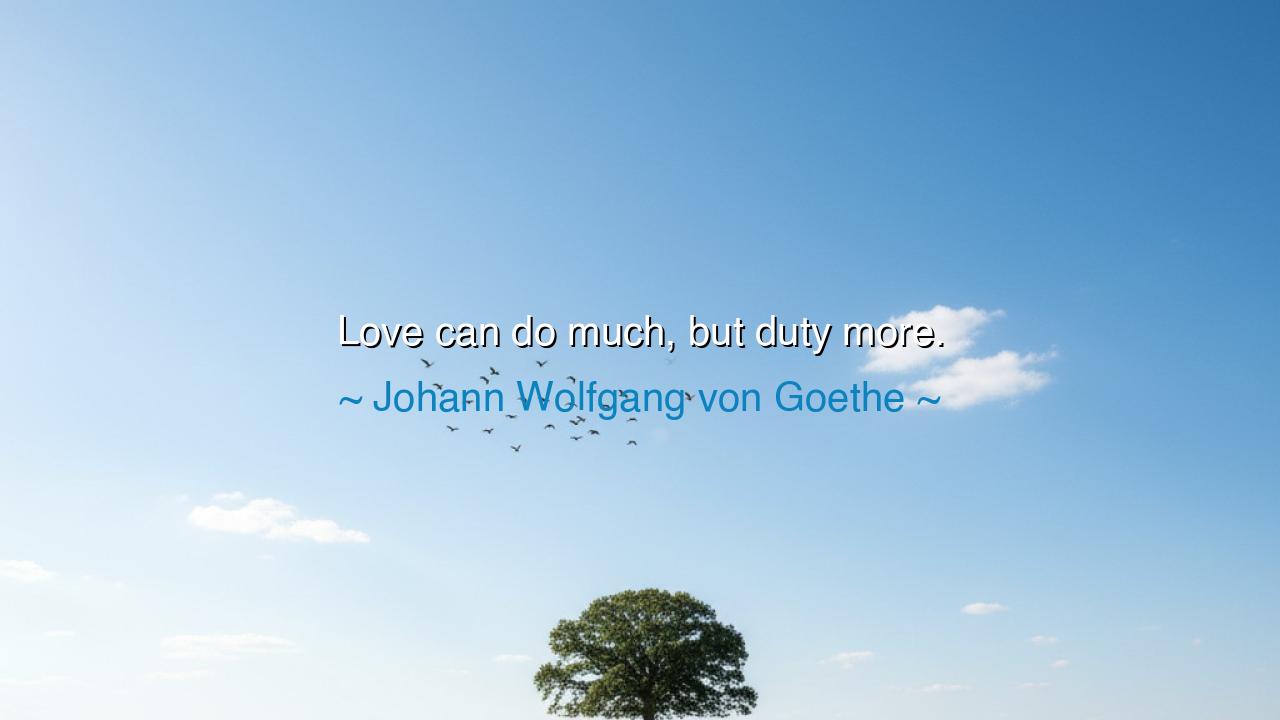
Love can do much, but duty more.






“Love can do much, but duty more,” wrote Johann Wolfgang von Goethe, that sage of the German soul whose words still shimmer with timeless truth. In this brief but mighty saying, Goethe reveals one of life’s most profound lessons — that while love inspires, it is duty that endures. Love is the flame that kindles the heart, but duty is the steady light that guides it through the darkness. Love may move us to feel deeply, to dream boldly, to act with compassion — yet when love falters, it is duty that compels us to continue, to persevere, to do what is right even when the heart grows weary.
The origin of this quote lies in Goethe’s deep moral philosophy and his observation of human nature. Living in the age of Romanticism, he saw both the beauty and the peril of emotion ungoverned by principle. In his writings — from Faust to Wilhelm Meister’s Apprenticeship — Goethe portrays love as a divine force, yet one that can easily lead astray when not anchored by responsibility. He understood that human greatness is not measured only by passion, but by discipline — by the ability to fulfill one’s obligations with courage, even when love’s warmth has faded. For love, though sacred, belongs to the realm of feeling; duty belongs to the realm of the will. And in the long road of life, it is the will, not feeling, that carries us to the end.
To say that “love can do much, but duty more” is not to diminish love, but to ennoble duty. Love gives life color; duty gives it form. Without love, duty becomes dry and joyless — yet without duty, love becomes fleeting and weak. The two must walk together, but when they part, it is duty that remains faithful. When the fire of love dims, duty keeps the hearth warm. It is the silent strength that bears the burdens of family, of work, of conscience. Love may inspire sacrifice in a moment of passion, but duty demands sacrifice day after day — not in glory, but in perseverance.
Consider the story of Florence Nightingale, the Lady with the Lamp. Her compassion — her love for suffering humanity — drew her to the battlefields of Crimea. But it was not love alone that sustained her through the sleepless nights, the stench of disease, the despair of dying soldiers. It was duty, a sacred sense of purpose that bound her to her task when her body ached and her spirit faltered. Love began her journey, but duty carried her through it. In her unwavering service, she embodied Goethe’s wisdom — for love may move the heart, but duty moves the world.
Goethe’s insight also speaks to the hidden heroism of ordinary lives. Every parent who rises before dawn to labor for their children, every soldier who stands guard in the cold, every teacher who continues to guide the ungrateful, lives out the truth that duty is love made steadfast. Love may say, “I feel,” but duty says, “I will.” Love may build castles in the sky, but duty lays the stones that endure the storms. And when the winds of life blow harshly, it is duty that keeps the soul upright — not through passion, but through faithfulness.
Yet, Goethe’s wisdom is not a call to coldness; it is a call to mature love. For the highest form of love is not the love that delights, but the love that endures — the love that transforms into duty willingly. It is easy to act kindly when the heart is full of affection, but true virtue shines when one continues to act rightly after affection fades. In this, love and duty are not enemies, but stages of the same divine progression: love is the seed, duty the tree. The one inspires, the other sustains. Together they form the fullness of human nobility.
So, dear listener, the lesson of Goethe is this: let love guide you, but let duty sustain you. When the heart is aflame, act with compassion; but when the flame flickers, let your will be the torch that carries the light forward. Do not wait to feel in order to do — for feelings are the tides, and duty is the shore. Love may falter, but duty endures; love may inspire, but duty perfects.
For in the end, it is duty that proves the depth of love. Words of affection are many, but steadfast deeds are few. Therefore, live not by impulse, but by principle. Love deeply, yes — but when love is tested, stand firm in duty. For when passion fades and years grow heavy, it will not be love’s whisper but duty’s voice that says, “Continue.” And in that faithful perseverance lies the truest expression of love — the kind that neither time nor trial can destroy.






AAdministratorAdministrator
Welcome, honored guests. Please leave a comment, we will respond soon